We’ve rounded up 10 tips for you to keep in mind while you’re living out of a suitcase.
1. Bring your favorite water bottle, or invest in one
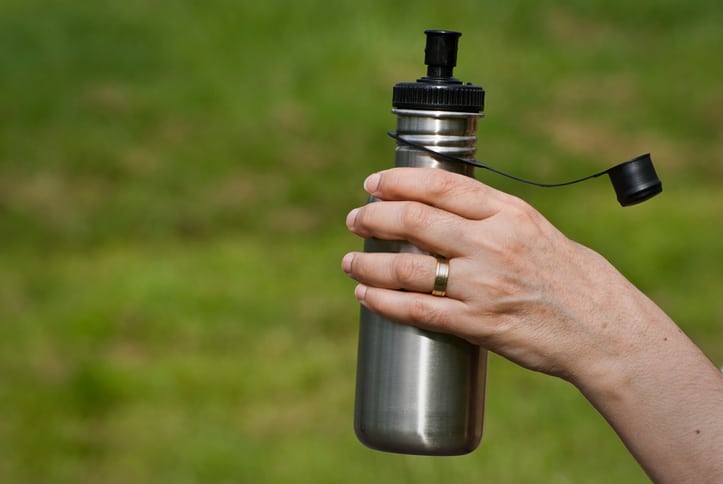
Carrying a reusable water bottle will help you continuously stay hydrated during your trip and is better for the environment than purchasing bottled water.
Hotels and conference centers often have purified water on hand you just need the receptacle.
Not a water bottle person? If you find and invest in a water bottle you actually like, you’ll be less likely to forget it and more likely to make a routine out of bringing it around with you. Your body, and your wallet, will appreciate the change.
Thirst can also be sometimes mistaken for hunger. Fun fact: The same part of your brain that is responsible for interpreting hunger signals is also responsible for interpreting thirst signals.
Did you know that even airplane air can be dehydrating? This is as a result of the lack of humidity in the cabin air. RN Marijke Vroomen-Durning explains that cabin air has the humidity level of 10 to 20 percent, much lower than the typical comfortable indoor humidity level of 30 to 65 percent. So instead of ordering a soda or a glass of wine on your flight, stick to water to feel the most refreshed.
As a rule of thumb, most experts recommend consuming 8 ounces of water per hour on a flight, as Vroomen-Durning notes, and 1 ounce for every pound of body weight during the day. Check out what your daily water intake target should be with this calculator.
2. Always be snacking

After airport lines, traffic delays, and arriving late to your hotel, it might be difficult and discouraging to find something healthy to eat when you are hungry. And to top it off, countries have varying regulations and restrictions when it comes to what food is permitted in your carry-on and even your checked baggage.
For international travel, plan ahead and find a nearby grocery store near your hotel or conference center and prepare snacks to keep your blood sugar stable throughout your trip.
Need ideas? We’ve compiled a list of healthy snack ideas for life on the road.
3. Stick to an exercise routine
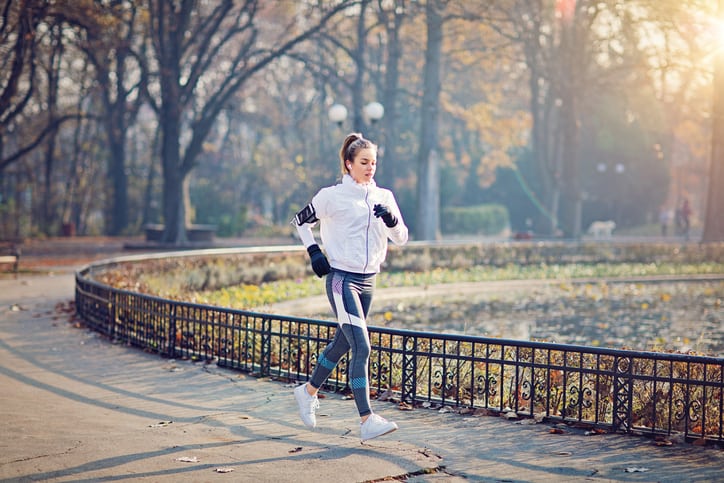
Regular exercise has been proven to reduce stress, ward off anxiety and feelings of depression, boost self-esteem, and improve sleep – all contributing factors to a successful and enjoyable recruitment season.
Just like packing your outfits and toiletries, also pack your workout clothes and a pair of running shoes. Even getting out for a 20-minute or 30-minute walk in the morning or evening while calling home or catching up with the daily news makes a different.
If you prefer to do laps in the hotel pool, consider bringing a swimsuit.
Don’t hesitate to ask the concierge to map out a close by scenic jogging or biking route.
Stick with the plans you made for yourself.
4. Find local classes to keep you motivated
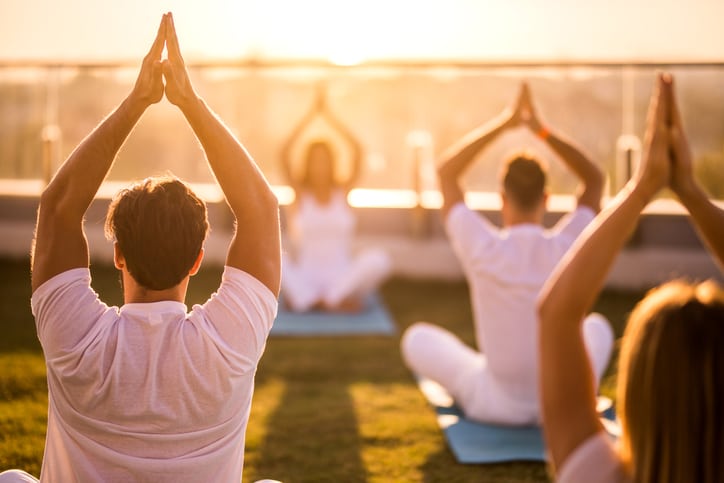
If you are motivated by exercise classes, consider an app like ClassPass or MindbodyOnline to schedule classes in the cities you’ll be visiting. Make exercise the one constant in trips full of uncertainty.
Some hotels even offer complimentary classes. You might be pleasantly surprised to find something unique like rooftop yoga is offered in your hotel.
5. Augment exercise with entertainment
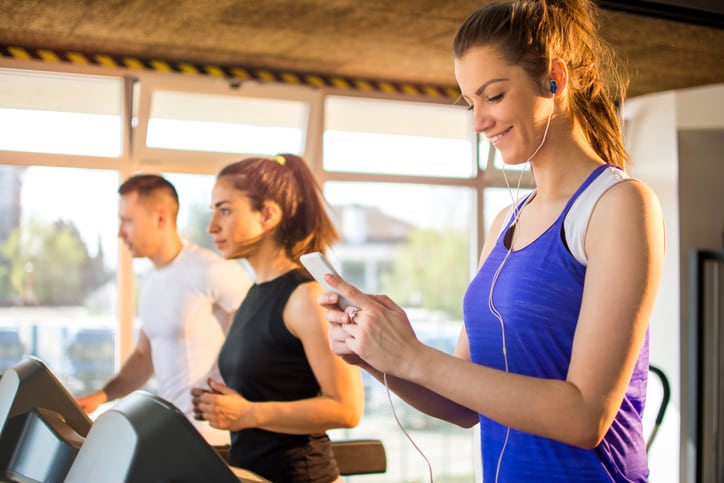
If you don’t want to participate in fitness classes, don’t fret.
You can find a podcast, TV show, or book that you can load on your phone or tablet and unwind by enjoying it on the bike in the hotel gym instead of in your room. Podcast apps and several popular streaming services like Netflix will allow you to download several of their titles to a smartphone or tablet while on a wireless connection, so you can load it up, even if the gym doesn't offer Wifi.
See: Downloading TV shows and movies on Netflix.
Combining entertainment and exercise can serve to hit two birds with one stone after a long day.
6. Book walking meetings

Another way of incorporating fitness during recruitment season is to go on walks for your meetings, also known as “walk and talk” meetings. It may not be a traditional way to chat with an applicant, but it might be a refreshing change from conference centers for both of you.
7. Avoid caffeine-heavy beverages before and during your flight

Caffeine-heavy beverages such as coffee, cola, and energy drinks will affect your ability to sleep and increase jet lag recovery time.
Your body functions best when it’s hydrated, so drinking lots of water is a great way to offset the effects of jet lag.
Free hot water is one of the few remaining in-flight freebies, so bring your own herbal tea bags.
8. Mentally-prepare for jet lag

When you get on the plane, set your watch to the time of your destination to get yourself psychologically aligned. Warning: Don’t do this too far beforehand, unless you want to end up with the world’s most ridiculous excuse for missing your flight.
Our circadian rhythms have evolved to be linked to the solar day, meaning our internal clock can be easily influenced by quantities and timings of daylight. A tip from experienced air travelers is to go out and get exposure to morning sunlight and take evening melatonin if you’re traveling east to fast-forward your body clock. As for traveling west, evening natural light and morning melatonin will help rewind your body clock.
9. Find ways to get outside

If you can't get walks into your day, having lunch or dinner outside in a park or on a patio is a good way of getting vitamin D. You can't get the right amount of vitamin D your body needs from food, and it can improve your mood, help with depression and aid in alleviating stress.
Last but certainly not least...
10. Find time for you
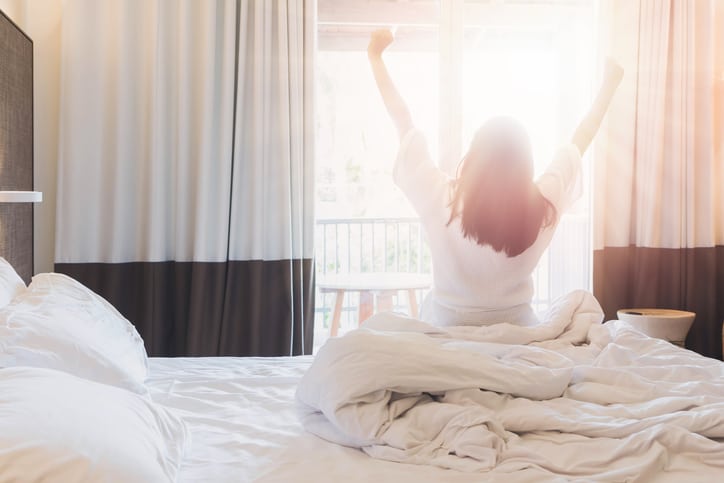
With all the hustle and bustle, make time to relax and enjoy yourself. Your mental health is as important, if not more important than your physical health while traveling. Read books, see shows, and don’t beat yourself over having a burger or taking it easy one night.
Everything in moderation, as they say!
Take it all in. Travel season will be over before you know it.



